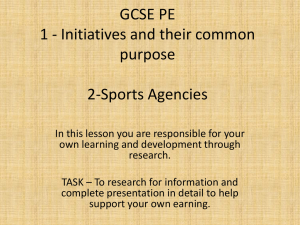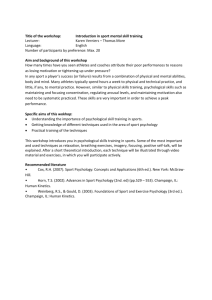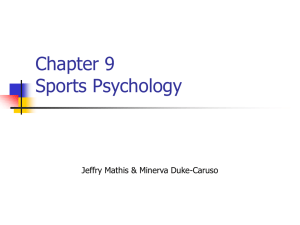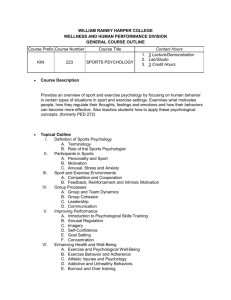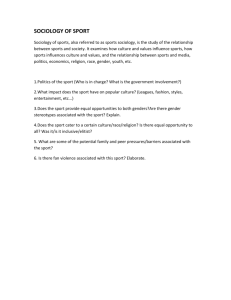101 evaluation tests - Peak Performance Online
advertisement
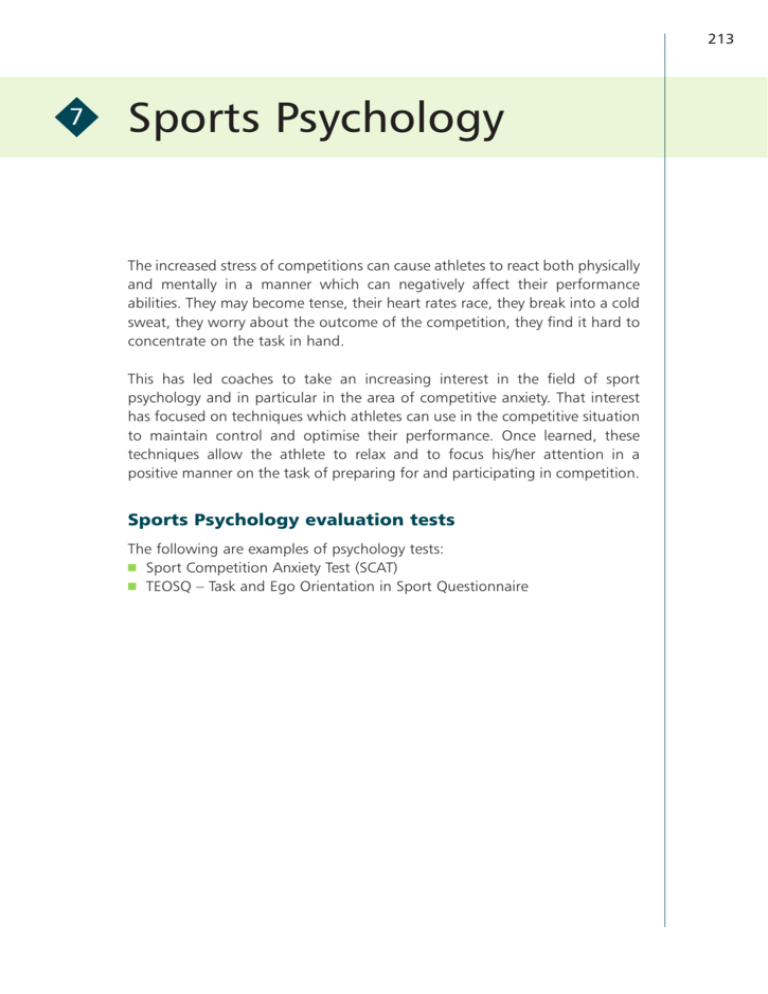
213 7 Sports Psychology The increased stress of competitions can cause athletes to react both physically and mentally in a manner which can negatively affect their performance abilities. They may become tense, their heart rates race, they break into a cold sweat, they worry about the outcome of the competition, they find it hard to concentrate on the task in hand. This has led coaches to take an increasing interest in the field of sport psychology and in particular in the area of competitive anxiety. That interest has focused on techniques which athletes can use in the competitive situation to maintain control and optimise their performance. Once learned, these techniques allow the athlete to relax and to focus his/her attention in a positive manner on the task of preparing for and participating in competition. Sports Psychology evaluation tests The following are examples of psychology tests: 4 Sport Competition Anxiety Test (SCAT) 4 TEOSQ – Task and Ego Orientation in Sport Questionnaire 214 7 4 SPORTS PSYCHOLOGY 7.1 4 Sport Competition Anxiety Test (SCAT) Assessing Your Anxiety Read each statement below, decide if you "Rarely", "Sometimes" or "Often" feel this way when competing in your sport, and tick the appropriate box to indicate your response. Rarely Sometimes Often 1. Competing against others is socially enjoyable 9 9 9 2. Before I compete I feel uneasy 9 9 9 3. Before I compete I worry about not performing well 9 9 9 4. I am a good sportsman when I compete 9 9 9 5. When I compete, I worry about making mistakes 9 9 9 6. Before I compete I am calm 9 9 9 7. Setting a goal is important when competing 9 9 9 8. Before I compete I get a queasy feeling in my stomach 9 9 9 9. Just before competing, I notice my heart beats faster than usual 9 9 9 10. I like to compete in games that demands a lot of physical energy 9 9 9 11. Before I compete I feel relaxed 9 9 9 12. Before I compete I am nervous 9 9 9 13. Team sports are more exciting than individual sports 9 9 9 14. I get nervous wanting to start the game 9 9 9 15. Before I compete I usually get uptight 9 9 9 Athlete’s Name SCAT Score Less than 17 : You have a low level of anxiety 17 to 24 : You have an average level of anxiety More than 24 : You have a high level of anxiety 7 4 SPORTS PSYCHOLOGY Analysis The score for the response to each question is detailed below. Enter the score for each question in the “Athlete’s Score” column and then total the column up to provide a SCAT score. Note that questions 1, 4, 7, 10 and 13 score zero regardless of the response. Question No Rarely Sometimes Often 1 0 0 0 2 1 2 3 3 1 2 3 4 0 0 0 5 1 2 3 6 3 2 1 7 0 0 0 8 1 2 3 9 1 2 3 10 0 0 0 11 3 2 1 12 1 2 3 13 0 0 0 14 1 2 3 15 1 2 3 Athlete’s Score Total SCAT Score Less than 17 17 to 24 More than 24 Analysis : You have a low level of anxiety : You have an average level of anxiety : You have a high level of anxiety On-line calculator Select the following link to access the on-line calculator 4 sport competition anxiety test.htm 215 216 7 4 SPORTS PSYCHOLOGY 7.2 4 TEOSQ – Task and Ego Orientation in Sport Questionnaire The Task and Ego Orientation in Sport Questionnaire (TEOSQ) can be used to assess whether an individual defines success in a sporting context as mastery (task orientated) or outperforming others (ego orientated). Questionnaire TEOSQ is a 13 item questionnaire measuring task orientation (7 questions) and the other ego orientation (6 questions). Before completing the questionnaire, the individual is asked to think of a time when they felt most successful in their sport and answer the questions based on this. The answers are indicated on a 5 point scale, where 1 = strongly agree and 5 = strongly disagree. Questions Consider the statement "I feel most successful in sport when…" and read each of the following statements listed below and indicate how much you personally agree with each statement by entering an appropriate score where: 4 1 = strongly disagree, 2 = disagree, 3 = neutral, 4 = agree and 5 = strongly agree I feel most successful in sport when… 1. 2. 3. 4. 5. 6. 7. 8. 9. 10. 11. 12. 13. I am the only one who can do the play or skill I learn a new skill and it makes me want to practise more I can do better than my friends The others cannot do as well as me I learn something that is fun to do Others mess up "and" I do not I learn a new skill by trying hard I work really hard I score the most points/goals/hits, etc Something I learn makes me want to go practise more I am the best A skill I learn really feels right I do my very best. 7 4 SPORTS PSYCHOLOGY Analysis The ego orientated questions are questions: 1, 3, 4. 6, 9 and 11 The task orientated questions are questions: 2, 5, 7, 8, 10, 12 and 13 A mean score is calculated by adding all the scores for all the task orientated questions and dividing by 7 and doing the same for the ego orientated questions but dividing by 6. This gives a mean score between 1 (low) and 5 (high) for each orientation. Target group This test is suitable for all athletes. Reliability Reliability would depend upon how strict the test is conducted and the individual's level of motivation to perform the test. Validity There are no published tables to relate results to potential performance in competition. On-line calculator Select the following link to access the on-line calculator 4 the task and ego orientation in sport questionnaire.htm 217
